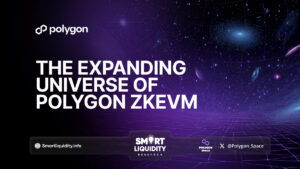Polygon CDK and Modular Development


Polygon CDK and Modular Development: A New Era in Blockchain Innovation.
Blockchain technology has made remarkable strides in recent years, and with it, the tools and frameworks that enable its growth continue to evolve. One such innovation is the Polygon CDK (Composable Development Kit), a solution designed to empower modular development and streamline the process of building decentralized applications (dApps).
By focusing on flexibility and customization, Polygon CDK aims to simplify the complex nature of blockchain development, offering developers an efficient path to creating scalable and secure blockchain solutions.
The Rise of Modular Development
Modular development refers to the approach of breaking down a system into smaller, manageable components or “modules.” This strategy allows developers to customize, optimize, and upgrade individual parts of their blockchain networks, making the entire system more flexible and adaptive. Polygon’s modular framework is specifically designed to support this structure, offering developers a high degree of control over their blockchain architecture.
By adopting modularity, developers can build custom blockchain networks that cater to specific use cases. For instance, they can select and integrate specific modules for consensus, data storage, or smart contract functionality, based on the requirements of their project. Consequently, this approach ensures that developers only use the resources they need, improving efficiency and reducing unnecessary overhead.
Benefits of the Polygon CDK
One of the key benefits of using Polygon CDK is its interoperability. Through modularity, developers can ensure that their applications are compatible with other blockchain ecosystems. This promotes seamless communication between networks, which is vital for the future of decentralized finance (DeFi) and other blockchain-based sectors.
Moreover, the CDK allows for custom scalability. By choosing different modules, developers can easily scale their applications based on user demand. As the demand grows, they can adjust the system’s resources without overhauling the entire network.
Lastly, the security of blockchain networks is enhanced through the CDK’s robust protocols. Developers can customize security features, tailoring them to the unique requirements of their projects. This flexibility is crucial in safeguarding data and ensuring that the application remains resilient to attacks.
Conclusion
Polygon CDK represents a significant leap forward in the world of blockchain development. By supporting modularity, interoperability, and customization, it empowers developers to build highly scalable, secure, and efficient decentralized applications. As the blockchain ecosystem continues to expand, tools like the Polygon CDK will undoubtedly play a critical role in shaping the future of blockchain technology.
Disclaimer:
This article is for informational purposes only and does not constitute financial advice. Readers are encouraged to conduct their own research and consult with a financial professional before making any investment decisions.




